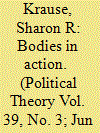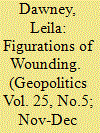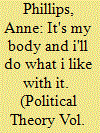|
|
|
Sort Order |
|
|
|
Items / Page
|
|
|
|
|
|
|
| Srl | Item |
| 1 |
ID:
105921


|
|
|
|
|
| Publication |
2011.
|
| Summary/Abstract |
A better appreciation of the material, distributed quality of human agency can illuminate subtle dynamics of domination and oppression and reveal resources for potentially liberatory political action. Materialist accounts of agency nevertheless pose challenges to the notion of personal responsibility that is so crucial to political obligation and democratic citizenship. To guard against this danger, we need to sustain the close connection between agency and a sense of selfhood that is individuated, reflexive, and responsive to norms. Yet we should acknowledge that reflexive selfhood is not the whole of individual agency for the sources of agency extend beyond the individual herself. We also need to recognize the ways that both reflexivity and norm-responsiveness are themselves embodied capacities. When properly conceived, a materialist view of agency can increase awareness of our often-unwitting contributions to systematic inequalities of power and extend our political responsibilities in emancipatory directions, thus holding great promise for democratic
|
|
|
|
|
|
|
|
|
|
|
|
|
|
|
|
| 2 |
ID:
175326


|
|
|
|
|
| Summary/Abstract |
This article argues that the figures of the wounded and dead soldier are central organising nodes in public objects, events, and institutions and are generative of intense affects and feelings, which are in turn bound to and constitute geopolitical imaginaries. Through these figurations, bodies of wounded and dead soldiers are brought to visibility, becoming key technologies for the production of authority and attachment, and fostering powerful affective responses in publics that work to amplify and enliven particular forms of neoliberal militarised nationhood.
|
|
|
|
|
|
|
|
|
|
|
|
|
|
|
|
| 3 |
ID:
107948


|
|
|
|
|
| Publication |
2011.
|
| Summary/Abstract |
What, if any, is the problem with treating bodies as objects or property? Is there a defensible basis for seeing bodies as different from "other" material resources? Or is thinking the body special a kind of sentimentalism that blocks clear thinking about matters such as prostitution, surrogate motherhood, and the sale of spare kidneys? I argue that the language we use does matter, and that thinking of the body as property encourages a self/body dualism that obscures the power relations involved in all contracts that cedes authority over the body. Recognising the self as embodied, however, also makes it harder to insist on sharp distinctions between activities that involve the body and those that "just" involve the mind, hence harder to justify refusing payment for explicitly body services while condoning it for those to which the body is more incidental. I therefore provide a modest defence of monetary compensation for those who "donate" bodily products or services. Compensation does not, however, mean markets for there is at least one sense in which the body is special. This is that more so, and more intrinsically than other markets, markets in body parts or bodily services depend on inequality. I use this to make a case against such markets.
|
|
|
|
|
|
|
|
|
|
|
|
|
|
|
|
| 4 |
ID:
111508


|
|
|
|
|
| Publication |
2012.
|
| Summary/Abstract |
In order to trace the trajectory of women's gains and losses since Bangladesh's independence over four decades ago, the centrality of women's bodies is brought to the fore. This is illustrated through the campaign work surrounding the movement to oppose violence against women and the struggle for sex workers' rights, where discourses of bodies are shown to be pertinent for the struggle for representation, and establishing women's rights in these domains. The roots of these struggles are, however, closely linked to the liberation struggle in the early 1970s, showing that contemporary areas of social contestation have a long history. This is an adaptation of the keynote address given at the 25th Anniversary Conference of the British Association of South Asian Studies, University of Southampton, 11-13 April 2011.
|
|
|
|
|
|
|
|
|
|
|
|
|
|
|
|
| 5 |
ID:
169265


|
|
|
|
|
| Summary/Abstract |
The ‘Sinicization’ of the Uyghur world – that is, the pervasive progression of Chinese influence into it – is a familiar topic of both Uyghur complaint and academic writing on Xinjiang. In this article, I discuss the striking appearance of this same motif in reference to the Sinicization of the physical Uyghur body, and use this example to argue that the communally enforced moral separation of the Uyghur from the Chinese, and the particular understanding of history that underpins this, have epistemological consequences for how the Uyghur people see themselves and the world.
|
|
|
|
|
|
|
|
|
|
|
|
|
|
|
|
| 6 |
ID:
174507


|
|
|
|
|
| Summary/Abstract |
The rise of Shanghai as a global city prompts the question: to whom does it belong? This article addresses the issue by examining the desirability of bodies in one of the city’s cosmopolitan spaces: a coworking space patronised by an international clientele. Drawing on an analysis of visual encounters in both physical and virtual spaces, it shows that the logic of belonging in the coworking community is based on the distinction between two kinds of bodies: the desirable one of the transnational professional and the undesirable one of the rural-urban migrant worker. While the latter is reduced to its working function, the former appears as a body complete with desires, whose interactions with others blur the separation of the professional and the intimate in line with the new spirit of capitalism. This visual ethnography provides insights on how economic changes reshape Shanghai’s urban life not only by reproducing local patterns of social exclusion, but also by encouraging racialised desires suited to capitalist accumulation on a global scale.
|
|
|
|
|
|
|
|
|
|
|
|
|
|
|
|
|
|
|
|
|